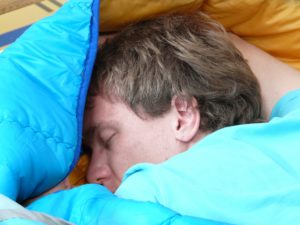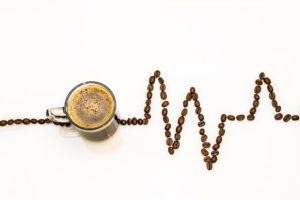Caffeine: Is it Helping You or Hurting You and How to Find Out
I used to be a caffeine junkie. When I was growing up we were not allowed to have soda. When I got to college I realized I could drink all the diet soda I wanted! I literally lined my tray with glasses of diet soda! Crazy I know, for so many unhealthy reasons.
I was so jumpy from all the caffeine.
A few years after college after having numerous health issues, I decided to give up the soda not realizing the impact that caffeine had on me. I was miserable for days when I went off soda cold turkey (and I don’t recommend it).
Caffeine in the right amounts may be good for you. Read on to find out if caffeine is doing you a favor or hurting you.
How Many Milligrams of Caffeine Do You Drink Daily?
Do you consume caffeine daily in the form of coffee, tea, soda or energy drinks? Many Americans consume caffeine daily and do not realize the added damage they may be doing to their bodies. While caffeine in small doses has shown to have benefits, many Americans consume their caffeine in 14 to 20- ounce servings and that’s just one serving in their day.
One cup of coffee can contain in the range of 144 mg. to 333 mg. of caffeine. If you consume 300 mg. or more of caffeine per day it may be disturbing your sleep, contributing to anxiety and may increase your risk for heart disease.
Spend a few days on keeping a caffeine log. You may be surprised by the amount of caffeine that you drink. For instance, I had a client who drank a lot of bottled ice tea, on top of her cups of coffee. She was not counting the bottled ice tea into the equation.
Read labels. It may also be in your sports product. More info on that in this article
Since we are all biochemically different your detox of caffeine will differ from someone else’s ability to detox caffeine. I will talk more about this later in the article.
Caffeine Milligram Amount in 5 Ounces
Note that these caffeine amounts are in ONLY 5 ounces. I’m guessing most of your caffeinated beverages are in larger portions than 5 ounces.
• Energy Drinks: 51-95 mg
• Coffee: 40-180
• Green Tea: 24-50
• Guarana: 24
• Yerba Mate: 15
• Soda: 12-24
• Black Tea: 8-39
• White Tea: 8-39
• Chocolate: 5-193
• Cocoa: 2-7
Do You Rely on Caffeine?
Ask yourself, what would happen if you skipped your morning or mid-morning coffee? Would you feel fine or would you not be able to function or have the energy to get through your day?
If you are relying on caffeine because you “need” it, you need that pick me up and that energy boost to get through the day, this is a good indicator that your body is not providing the energy that you need. Instead of relying on caffeine you need to look at the root causes of why you need this pick me up to get through the day.
If this is you, you need to ask yourself why you are so tired (overworked, not sleeping well, too many obligations, poor diet, etc.). What would happen if you went a day without the caffeine. Does it make you worried just thinking about it?
Coffee has it benefits. But if one cup of coffee at breakfast turns into another one as soon as you get to work, soda at lunch, and more coffee mid-day and before you know it, you have become dependent upon caffeine. Or are you the person that doesn’t need just a cup of coffee in the morning but numerous expresso shots to get going?
You have probably heard about the benefits of caffeine. One to two 6- ounce cups per day is not bad per say, but when your 6 oz. turns into a 16 ounce or when you feel fatigued or have a headache when you don’t have your daily dose of caffeine, that’s when you should get concerned. If you feel sluggish or get a headache when you don’t get caffeine, your body is telling you that you are dependent on your daily caffeine dose.
What Too Much Caffeine Can Do to The Body
• Raise cortisol levels and overstimulates your adrenal glands
• Increase blood pressure
• Lower hormonal levels of DHEA
• Lowers your stress threshold (what didn’t stress you out in past now does)
• Increased fatigue when the caffeine wears off later in the day
• Increases dopamine levels same way sugar does (or amphetamines but not as dramatic)
• Studies done on children: The more caffeine you consume, the greater risk of depression and anxiety
• For some, as little as 100 mg. per day can cause a decline in recall ability and reasoning
• Can lower academic performance
• Reasoning skills are decreased (but simple tasks such as assembly work may be enhanced)
• Too much caffeine can deplete you of B vitamins. B vitamins are a natural energy source.
• It can also deplete your magnesium, potassium and zinc levels.
• Body becomes addicted to caffeine at 100 mg. per day
• Doses of 250 mg. daily can cause anxiety
• Can increase cholesterol
• May harm eye health
Signs That You Are Dependent Upon Caffeine
• If you skip your regular cup of coffee or soda you get a headache. This is not the only withdrawal symptom of going without caffeine but is a major one. This tells you that you are dependent upon the caffeine. If you are trying to reduce your caffeine consumption never go cold turkey for this reason as the headaches can be migraine-like. Slowly reduce the amount you drink at each serving daily.
• You can’t start your day or wake up without it. Your body’s cortisol levels should be at its peak in the morning to get you up, out of bed and ready to start your day. If you can’t get moving without some caffeine it could be an indication that your adrenal glands are fatigued, and your cortisol levels are out of balance. The answer for what to do for adrenal fatigue is not to consume more caffeine but to support the adrenal glands with nutrient dense whole foods and hydrate with water. Start the day with 16 ounces of water before you eat or drink anything else.
• You have difficulty falling to sleep at night or wake up middle of the night. Caffeine consumed up to 8 hours prior to bedtime can disrupt your sleep. Caffeine can also suppress your production of melatonin.
• You have energy swings or periods of fatigue during the day. Caffeine contributes for some to the blood sugar roller coaster ride, causing spikes and drops in your blood sugar levels. When your blood sugar levels are low you notice the fatigue and reach for another cup of caffeine for a pick me up and thus it becomes a ride that never ends. Caffeine will impact blood sugar more so when consumed on an empty stomach. It is best to drink your coffee, or tea with a meal or a healthy snack.
• You find you have difficulty relaxing, are more anxious, experience more anxiety. Caffeine interferes with the metabolism of GABA, your neurotransmitter that is known for its calming properties. Thus, caffeine can lower your ability to relax. Lower GABA levels will also impact your coping skills and you may be more irritable. Caffeine basically lowers your stress threshold
• You experience mood swings or periods of depression during the day. Caffeine impacts your dopamine levels and your DHEA levels both which are important for mood balance.
• You have high blood pressure. Your high blood pressure may be caused by dietary factors but add in caffeine and your blood pressure will be even higher. If you have hypertension you should stay away from caffeine.
• Other signs that may indicate you are consuming too much caffeine include clenching your jaw or teeth grinding at night, ulcers, ringing in the ears, hand tremors or restless leg syndrome.
Caffeine, Your Genes and Your liver:
How to know If Caffeine is Right for You
Some people do better with caffeine than others. This could be genetic related and/or could be related to your detox pathways.
If you have your “23 and me” information, you can go into the raw data tab and plug in rs762551. This gene snp will show how well you break down caffeine (as well as acetaminophen).
If in the last column of the raw data you should see the letters AA, AC or CC. The letters AA mean you are a fast metabolizer of caffeine. For you, caffeine can give you a quick jolt but then leaves your body readily. These people, according to studies, also benefit from moderate caffeine use when exercising and it has been shown to boost exercise performance (strength and endurance).
If you are an AC, this means that you are a moderate metabolizer of caffeine, so you fall somewhere in the middle (not too slow, not too fast, just right!). In studies this group of people performed the same in exercise workouts with or without caffeine. The caffeine had no effect on how well they did, even with higher caffeine amounts.
If the last column has CC then you are a slow metabolizer of caffeine. This means that you perform worse with caffeine in your system! Your heart disease risk also increases with caffeine use! You are the person that would do best with little to no caffeine.
If you are taking Prozac, an SSRI for depression, this drug can block this enzyme pathway. For instance, if you are an AA and are a fast metabolizer of caffeine, suddenly now while you are on this drug, you find that caffeine makes you feel irritable, have anxiety, jittery, it could be because now you are not metabolizing the caffeine.
Now remember, your genes don’t define you, they are just a piece of you and genes can be turned on or off with diet and lifestyle so take that into consideration.
Another piece to the caffeine processing puzzle is the liver. If you are very sensitive to caffeine, such as you get jittery after just one cup of coffee, then this may be a sign that the first phase of liver detoxification is not working properly for you. If you are the person who can drink caffeine all day, even right before bed, you may have an over active phase one of liver detox and an under active phase 2. More information on the liver phases and supporting them can be found in this article
Caffeine Benefits
Caffeine is not bad. Caffeine can be harmful when you are consuming too much and for the reason of “needing it to get through the day”. Here are some reasons why you should not give up your caffeine all together. (remember your genes, diet/lifestyle and liver function play a role in whether you are reaping the benefits from caffeine or not) because as you will see many of the benefits are just the opposite of what was stated under the negative consequences of caffeine. In the end, it comes down to bio-individuality. We are all very different!
• Can improve attention and alertness
• Can increase endurance and strength
• Can improve mood
• May reduce dementia
• Can protect the liver
• Can prevent throat and mouth cancer, reduce colon cancer risk, prevent skin cancer
• Can relieve asthma
• May help with tinnitus
• May relives pain
• May prevent gout
Taper Process for Reducing Caffeine and What to Substitute
• Never go cold turkey!
• Instead of cutting back say from 4 cups of coffee per day to 2 or 3, instead gradually reduce the amount in each serving.
• For instance, if you drink 16 ounces in the morning, start by reducing this amount but keep the other servings the same
• Then slowly reduce the amount in one of your other servings. If it is soda, pour part of the can away before you drink the entire one.
• As you reduce the amount of caffeine, you can then switch to green tea and herbal teas that are caffeine free. Teeccino is a coffee substitute that many say tastes like coffee or try Dandy Blend which also has a coffee taste. If you drink tea and want to reduce the amount of caffeine, try organic yerba mate which contains less caffeine than green, and less than most white or black teas.
• The longer you brew your tea, the more caffeine it will contain. For instance, if you brew your black tea for 5 minutes it will have 60 mg.-90 mg. If you brew your tea for 3 minutes, it will have half that amount. Shorter brewing times can be an effective way to taper off caffeine.
• What size mug are you using? Is it huge? Switch to a small mug size if this is the case for you.
• If you drink coffee, soda and tea, start by cutting back on the coffee, then the soda, and you may not have to touch the tea at all.
• Always choose organic coffee since it is a very heavily sprayed and toxic crop.
Bottom Line: If you are dependent upon caffeine, it may be time to address why you are dependent and then after that start to cut back and eventually use cycling (have weekends as no caffeine days) to prevent dependence or use daily lower amounts. You may need to address liver detoxification if you are not only sensitive to caffeine but to smells, scents as well. If you have your raw genetic data, you can use this as a guide to know if you are someone who benefits from caffeine use or not.
Sources
Luebbe, A. & Bell, D. (8/09) Mountain Dew or Mountain Don’t? A pilot investigation of caffeine use parameters and relations to depression and anxiety symptoms in 5th and 10th grade students. Journal of School Health, Vol. 79, issue8, pp 380-387. Doi: 10.1111/j.1746-1561.2009.00424.x
Cherniske, S. (1998) Caffeine Blues. NY: Grand Central Publishing






Leave A Comment
You must be logged in to post a comment.